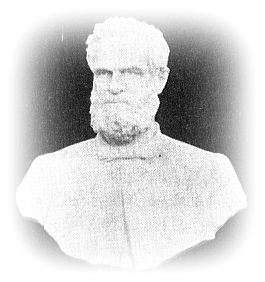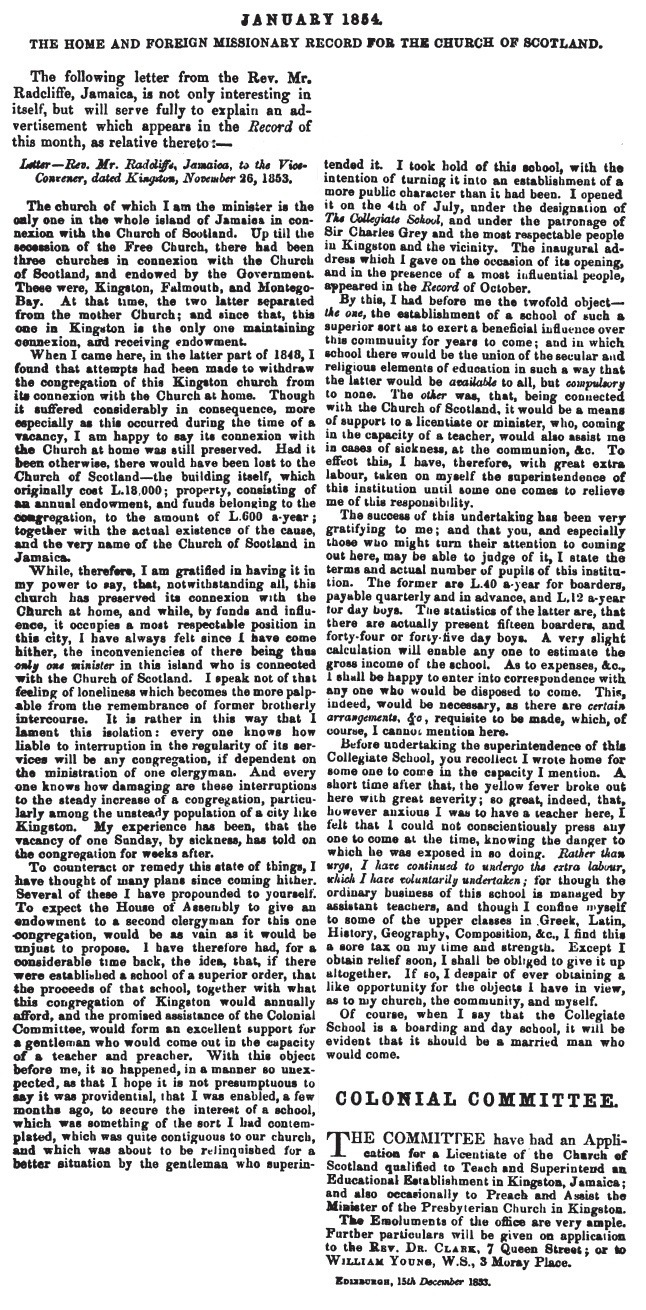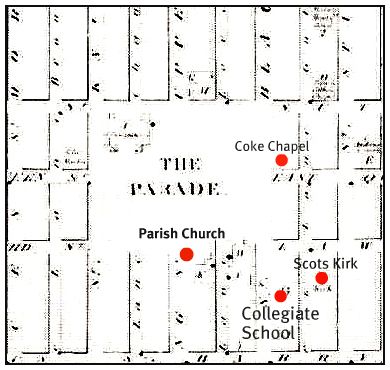THE COLLEGIATE SCHOOL (Kingston), Established 1853 by the Rev. John Radcliffe.
excerpt: Clinton Black on John Radcliffe in a Jamaica Historical Society broadcast on ZQI in 1947
In nothing did Mr. Radcliffe render better service to Jamaica than in the establishment and management of the Collegiate School. It is no longer in operation, but during its existence it turned out scholars who made names for themselves in all professions and in all forms of business. The careers of many of the "Old Collegiate Boys" have demonstrated effectively what one good school can do in a comparatively short time to furnish a country with men of the right stamp to undertake its most important and difficult work.
Daily Gleaner, March 9, 1947
St Andrew's Scots Kirk,
Duke Street, Kingston
For many years before Government gave any assistance to education, long before High Schools were established, the Rev. John Radcliffe had established his fame as a most successful teacher of youth in our midst. He established the Collegiate School, which is still remembered with affection as the cradle of learning, by many of the most prominent members of this community.
To his fostering care, his skillful tuition and his erudition in all the branches of a liberal education, many of our clergymen, barristers, lawyers, doctors and prominent merchants, owe the means which brought them into social and professional prominence . . . .
Daily Gleaner, May 1, 1889

The Rev John Radcliffe arrived in Kingston in 1848, to be
minister of the Scots Kirk.
There is the disappointment that every body landing in Jamaica feels to the present day, in finding himself in the squalid, malodorous streets of Kingston, after coasting along the magnificent panorama of towering, cloud capped verdure-clad mountains and smiling sunlit plains which feast the eyes of any one approaching Kingston from eastward and by sea.

Mr. Radcliffe's remembrances of the Stores of those days, is that each was a complete ominum gatherum and that the expression that they sold everything from a needle to an anchor conveys but a faint idea of the multifarious one may say "infinite variety" of these stocks of merchandize. There was a corresponding multiplicity of negotiation and a vast amount of drinking.

The
owner of the store was supposed to
supply a drink to every respectable person
who came on business - and what was
more to share in it with his customer.
I know no way by which I can
better illustrate and at the same time corroborate what
I say than relate what
was told me by a gentleman who it
still living, and who himself took part
in the scene which he himself
relates.
It had been Saturday - the great day
of business - the day of the influxion
of bushas into Kingston - and I must
add
the great day for the combination
of business and drink.
The time was somewhat after midday - the scene Harbour Street,
in a store
near where Mr.Pawsey's establishment now stands.
The characters were the proprietor, very
active - a busha,
very rubicund - and
a number of clerks in a back office,
very busy. In the midst of the business
the proprietor comes into
the office, and
hurriedly singling out one of the clerks
- the one who afterwards told me the
story - says to him, "for God's
sake go out and take a drink with
Mr. Busha Black. I have taken thirteen
already today and I am not good for
any more."
.
. . .
The
Reverend lecturer then describes the more
prominent citizens of Kingston of those days
who have now joined the
ocupants of the
Jamaica Valhalla. Among these he has words
of great admiration and respect for Richard
Hill the
accomplished naturalist, for Alexander
Heslop, Alexander Barclay, once Receiver General,
Edward Jordan, Louis Quier Bowerbank one of "the most resolute men I ever knew,"
S. Hendrick "great, bluff, kindly Englishman," who could add up the
three columns of
his cash book at one operation, Emanuel
Lyons with his widespread charity, and many
others.
[It is of interest that three of those Radcliffe remembered were Coloured Jamaicans - Richard Hill, Alexander Heslop and Edward Jordan.]
Radcliffe started the Collegiate School five years after he came to Jamaica.
In November 1853 Radcliffe wrote a letter about setting up the school:


April, May and June 1853.
[I thought I had copies of the adverts, but I have not located them - only the notes which
refer to them. I hope to make an expedition to the relevant library shortly to search out
these adverts, as well as quite a list of other references, books and pamphlets on various
topics. Then I can make this section a little more convincing!]
William Andrews, snr, as indicated in this extract from an obituary for one of them:
'A
very interesting personality has gone from
our midst in Mr. Andrews. Born in
Kingston [in 1843]
he came of a very respected family.
William Andrews, his father to
whom he
was devotedly and affectionately attached, was
one of the most successful
lawyers of
the day . . . . His son
was placed under
the charge of the Rev. Jno. Radcliffe
and thus became one of very many others
who owed much to the teaching of the
poet and scholar. By his fellow students
Mr. Andrews is remembered as an industrious
and studious lad yet always ready for a
bit of fun.'
Daily Gleaner, February 5,1898
Other Andrews sons, Edward, Raines and Ernest, also attended Collegiate.
This is the school they attended:
THE
COLLEGIATE SCHOOL, KINGSTON.
Principal.-The
Rev. J. Radcliffe.
Head-Master.
-The Rev. A. J. Milne, M.A.
The
primary object of the Collegiate School is
to furnish
an education similar to that
of the respectable schools
at home. In
addition to this, however, it aims at
supplying
one of a more collegiate
character.
Particular
attention is therefore paid to modern languages, to classics and mathematics, and
to the rules and practice of reading and composition. It thus affords
means of
preparation for young men entering the
mercantile profession, the university, and the
army.
In
the boarding department, the object is to
treat the
young gentlemen as a family,
and prepare them, by
social and religious
intercourse and [or ? for the] duties of
life.
The
arrangements are as follows:-
The
studies of each day are commenced with
reading a
portions of the Scriptures and
with prayer. No pupil,
however is asked
to be present, if intimation to that
effect be given either by his parent or
guardian.
There
is no interference with the creed of
any pupil.
II.
The hours of attendance are from nine
till three
III.
There are two Vacations in the year;
one at Christmas,
the other at Midsummer.
IV.
The terms are, for boarders, £45 including washing;
and for day scholars, £12 per annum, to be be paid
quarterly, and
for boarders in advance.
P.S.
- In connexion with, and forming part of, the
Collegiate School, there is a
Juvenile Preparatory Class,
the object of
which is to meet the wants of those
who are
too young to be benefitted by
the ordinary classes. As
the education is
of the most elementary sort, no one can
remain in the class after the age of
nine. The terms are
£8 per annum.

School between 1853 and 1864; if I find anything I will get it in here as
quickly as possible. Until such time we have to move straight on to the
1860s >>>